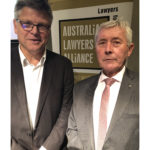No Right to Know: Government is Secretly Prosecuting Australian Citizens

Bohemian novelist Franz Kafka’s 1915 novel The Trial tells the surreal tale of bank clerk Josef K, who awakens one morning to find that two agents working for an unidentified government agency have turned up to arrest him on unspecified charges.
Mr K is summoned to appear in court, but is not told of its specific location or what time he should front up. Over the course of the novel, the protagonist never learns the crime he’s allegedly committed. However, a year later, two men turn up, take him to a quarry and execute him.
Of course, the author’s style of writing provides us with the term Kafkaesque, which, when applied to a society, describes one that’s oppressive, run by a dehumanised bureaucracy in an illogical manner, where basic human rights and freedoms are denied.
The recent secret imprisonment of a former senior military intelligence officer in the ACT can certainly be described as Kafkaesque. While it may not be as extreme as Josef K’s execution, the case of the mystery inmate – who’s been given the court pseudonym Alan Johns – is just as concerning and bizarre.
The secrecy surrounding ‘Alan Johns’’ imprisonment has even led a former NSW Supreme Court justice to question whether Australia is heading down a path towards totalitarianism, as fundamental democratic principles such as open justice are increasingly being curtailed.
The unknown detainee
Former senior military intelligence officer ‘Alan Johns’ was prosecuted in complete secrecy last year, for crimes unknown. He was reportedly sentenced to 15 months in prison. He served his time in Canberra’s Alexander Maconochie Centre (AMC).
Identifying the now former inmate or anything to do with the crimes for which he was convicted has been suppressed by commonwealth court orders, which themselves are not publicly available. Even the corrective services authorities had no idea of the offences that led to his imprisonment, making it impossible for them to properly classify him.
The inmate had stringent restrictions placed on his communications with family and friends whilst he was behind bars. And the Australian Federal Police requested that AMC management inform it about any “unusual” visitor requests made in respect of the former soldier.
The only reason this particular case has come to light is that Mr ‘Johns’ challenged some of the treatment he was subjected to by prison management in the ACT Supreme Court last July; a situation that raises questions about how many other secret prosecutions exist, and the basis for them in a society which is meant to be open and transparent.
AFP: The government’s attack dogs
A prison mental health nurse suggested to ‘Johns’ on 12 September last year that he start working on several manuscripts as a form of therapy, which would help him with his long-term recovery. And the former ADF employee ended up producing two novel length documents.
He wrote the books with the approval of then prison general manager Ian Robb. One of the works was described as “an alternative history fiction novel”, whilst the other was a memoir of his time in AMC, which revealed nothing specifically about his case, nor his criminal conviction.
Following the completion of the prison memoir, Mr Robb read it and said he had no problem with it. And in February this year, ‘Johns’ asked the new prison general manager Corinne Justason, whether Canberra author Robert Macklin could visit him in prison, in order to assist with the publication of the memoir.
But Justason notified the AFP, which led officers to raid the inmate’s prison cell, as well as his brother’s home. All copies of the memoir, as well as other writings, were seized. Mr ‘Johns’ was subsequently barred from using email for a two month period following the raids.
A challenge too late
As stated, the only reason the public has caught wind of ‘Johns’’ classified conviction and imprisonment was due to the release of the ACT Supreme Court findings into his legal challenge against the capital’s Justice and Community Safety Directorate.
Mr ‘Johns’ brought complaints against the department in relation to prison authorities informing the AFP about emailing his manuscript to his brother, along with its decision to withdraw his email privileges.
Released on 8 November, ACT Justice John Burns’ full findings set out that Justason wasn’t at fault in informing the AFP about the manuscript, as she was trying to abide by the suppression orders, and the lifting of the email ban was no longer an issue as the inmate had already been released.
Glimmerings of totalitarianism
Former NSW Supreme Court Justice Anthony Whealy told the Guardian last week that the secret prosecution and imprisonment of the former military agent displays a “complete abandonment of open justice”. And he questioned the future of the Australian legal system.
Open justice is one of the basic principles that the British-derived Australian law system is founded upon. This transparency leaves the justice process open to the scrutiny of the public and professionals, which in turn, helps to guard against abuses that could take place behind closed doors.
Former Justice Whealy further posed the question, “Are we now a totalitarian state where people are prosecuted, convicted and shunted off to prison without they or the public having any notion as to what has happened?”
And the revelations of these secretive proceedings come at a time when other high-profile cases are set to take place in closed courts. The trials of both Witness K and his lawyer Bernard Collaery, along with former military lawyer David McBride, will all take place behind closed doors.
However, McBride told Sydney Criminal Lawyers a few weeks back that the secrecy of his trial could backfire on the government, as there will be no excuse for the governor general to avoid taking the stand, because any sensitive matters discussed will only be before those with security clearances.
A slippery slope
At last Thursday’s Walkley awards, journalist Kerry O’Brien, when referring to this year’s AFP press raids on News Corp and ABC journalists, echoed some of the same sentiments as former Justice Whealy did in regard to the mystery ACT inmate fiasco.
O’Brien referred to the Right to Know campaign that saw various media join forces to “stand against an unacceptable step down the road to authoritarianism”, adding that “authoritarianism unchecked can lead to fascism”, and though the country isn’t there yet, “freedom is usually eroded gradually”.
The veteran reporter also implied that the Morrison government’s lack of response to calls for reform might be an attempt to wait for the “issue to go away”. But, O’Brien recommends vigilance, and he also posits that a country diminishing its own citizen’s rights, loses international credibility.








